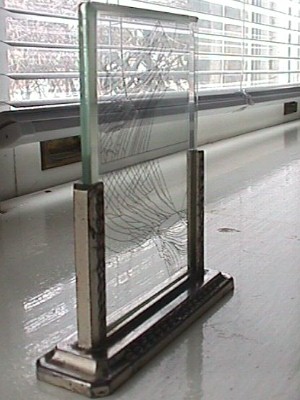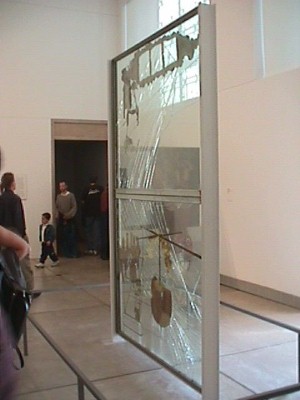2002.11.30
Critics Abuzz
| |
 
Stephen Lauf
In Case You Didn't Get It
2002.11.30
digital diptych
dimensions variable
2002.11.30 13:36
Re: positioning Étant donnés [wavelengths]
I went to the Philadelphia Museum of Art (PMA) Library two Tuesdays ago, but alas that is not the place to conduct research regarding Duchamp's involvement vis-ŕ-vis the Arensberg collection and its ultimate residing within the PMA. The Museum Archives is the place to do the research, but it just so happens that the Museum Archives have just begun the large project of organizing all the Arensberg/Duchamp archived material. [Do some people at the PMA read the Duchamp online bulletin board? I know that at last d'Harnoncourt reads Tout Fait.] Nonetheless, I did find out that the rooms that now accommodate Étant donnés and the visitors/viewers quarters were storage rooms before--at least that's what an older librarian(?) at the PMA remembers.
At this point, for me at least, it seems reasonable to believe that Duchamp was well aware of the (future Étant donnés) space at the PMA while he was secretly working on Étant donnés in NY, and that quite possibly this knowledge made it easier to work "underground" since what he was doing was already going to be a museum piece.
If Étant donnés is Duchamp's great underground work, is his activity at the PMA, especially his organizing of his own works within the museum, Duchamp's great above-ground work of the same period?
The original printing of the PMA Bulletin of 1969 that introduced Étant donnés contains a forward where "Dr. Evan Turner described the long relationship between Marcel Duchamp and the PMA..." [I have yet to read this text.]
Chapter 18 of Triumph on Fairmount: Fiske Kimball and The Philadelphia Museum of Art (1959) is entitled "The Arensbergs" and comprises a series of letters by Kimball that describe each of his visits with the Arensbergs in LA.
Entertaining anecdote from Triumph on Fairmount, p. 299:
The next day, Ingersoll was in the Arensberg galleries when Fiske came in with Perry Rathbone, the new director of the Boston Museum.
This is the 'big glass,'" he said, pointing to a large shattered pane of glass decorated with oil paint and lead wire in abstract patterns, which was mounted on a stand in front of the window looking out on the courtyard. "Duchamp called it The Bride Stripped Bare By Her Bachelors, Even." He laughed and went on in a loud voice to make several vulgar remarks.
"Fiske, you cannot talk like that here. Remember you are in a public place." "I'll talk as I please," said Fiske. "You aren't my boss any more."
Rathbone did not know what to make of this passage, for it was not until the following Tuesday, January 25, 1955 that Fiske's resignation was published.
[Museum Studies 6.2: on any given January 19 go stand in front of The Bride Stripped Bare By Her Bachelors, Even and laugh and make several vulgar remarks.]
|